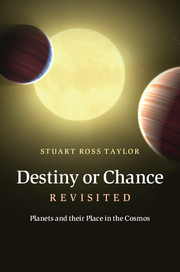3 - Forming planets
Published online by Cambridge University Press: 05 October 2012
Summary
“Making planets is an inherently messy business. A growing planetary system resembles an overly energetic infant learning to eat cereal with a spoon. Some is consumed, but much of it ends up on the floor, walls and ceiling” [1].
Planets were curiosities in most ancient models of the universe. But the discovery of Uranus and later Neptune led to speculation about their origin. Clearly they were distinct from stars and so might form in a different manner. But such notions came very late once it was established that they orbited the Sun and that the stars were remote.
The problem of building planets is fundamental to the entire question of the origin of planets. Historically, this latter question has frequently been considered to have been solved, but the wide variety of explanations and solutions that have been offered, from the creation myths of primitive societies to the more recent, but numerous scientific attempts, have generally collapsed when faced with new information. The latest problems stem from the bewildering variety of exoplanets. There are several difficulties.
- Type
- Chapter
- Information
- Destiny or Chance RevisitedPlanets and their Place in the Cosmos, pp. 59 - 90Publisher: Cambridge University PressPrint publication year: 2012



